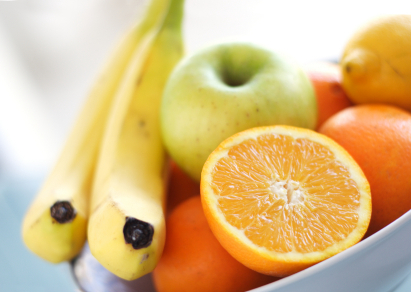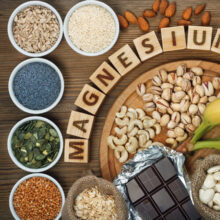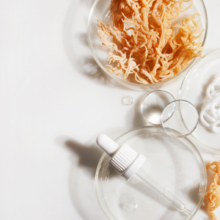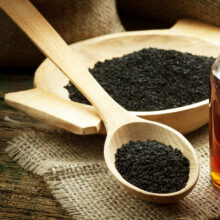What “Clean Eating” Should Mean to You
- Published: Tuesday, October 8th 2013
- in Nutrition
 Clean Eating. It’s a health trend that we see everywhere lately. Whether it’s presented on one of many social networking sites like Twitter, Instagram, Facebook, or Pinterest, on your local news program, or even featured in an article from your favorite magazine, someone out there is reminding us to eat clean. But not all of us know exactly what it’s about. So, what really is it? Are we all supposed to be hopping on this “clean eating” bandwagon if we haven’t done so already? It’s time to set the facts straight and clear up the uncertainties behind this craze.
Clean Eating. It’s a health trend that we see everywhere lately. Whether it’s presented on one of many social networking sites like Twitter, Instagram, Facebook, or Pinterest, on your local news program, or even featured in an article from your favorite magazine, someone out there is reminding us to eat clean. But not all of us know exactly what it’s about. So, what really is it? Are we all supposed to be hopping on this “clean eating” bandwagon if we haven’t done so already? It’s time to set the facts straight and clear up the uncertainties behind this craze.
What Is Clean Eating?
Before we get too specific, let’s start off with the basics, shall we?
Our biggest mistake involving healthy eating is confusing the terms “diet” and “lifestyle.” You should consider Clean Eating to be a lifestyle, not a diet (the word “diet” in itself always seems to scare us!) Clean Eating isn’t something we should dread, like we do with diets, so why label it as such? Instead, Clean Eating is something we should feel eager and open-minded about. The major purpose behind Clean Eating is to promote health and encourage individuals to become aware of the foods they’re consuming on a daily basis. In its simplest terms, Clean Eating is exactly that: simple. It’s a lifestyle in which you choose to eat foods in their most natural state, meaning avoiding foods that are processed or contain a large amount of artificial ingredients. The more ingredients a product contains, the likelier it is for this product to be highly-processed. Plus, food in its most natural state should only have one ingredient anyway, right?
The Run-Down
If you want to eat clean, any foods that are artificial must go. Instead, be sure that your food intake is packed with wholesome vegetables, nuts, and seeds. It’s also great to add a serving or two of whole grains to your meals, such as brown rice or quinoa, which will provide you with a ton of fiber, protein, and energy. We spoke with Susan Piergeorge, nutritionist at Golden Door, who gave us further tips on the best ways to eat clean. According to Susan, the best fruits to eat are berries (raspberries, blueberries and blackberries) because they also contain tons of fiber for digestive health and may contribute to maintaining healthy brain function. It’s also great to eat cherries and grapes, which are linked to heart and skin health.
Sometimes, we tend to think that healthy foods have a reputation for being bland and lacking in the flavor department. Susan, however, is convincing us otherwise. According to Susan, it’s easy to spice up the clean foods that you choose to eat. Herbs and spices that pack a nutritional punch include thyme, which is linked to a protective role in inflammation, and oregano, which contains antimicrobial and potential cancer risk-reduction properties. Other spices include cloves, which are linked to benefiting digestion, infection, and arthritis, as well as turmeric, which is linked with improving mental health.
Some people are fooled by Clean Eating and assume that it only promotes a vegetarian-friendly lifestyle. While Clean Eating clearly encourages us to eat the most fruits and vegetables possible, it definitely doesn’t eliminate animal products from our lives. If you’re not a vegetarian, Clean Eating is still realistic. If you choose to incorporate animal products such as dairy and meats in your life, the best way to do this is to choose dairy products that are farm fresh (from a local, organic farm would be best) and meats that are cage-free (including free-roaming grass fed organic meat). Free roaming animal meat has tons more vitamins and minerals and therefore it is completely Clean Eating friendly!
What’s the Easiest and Most Efficient Way to Eat Clean?
Since Clean Eating involves choosing the right foods, the best way to do that is by cooking your own meals. As opposed to buying overly-priced plates at a restaurant every day or picking up those pre-packed meals, cook your meals from scratch as often as you possibly can. If you think about it, foods that are clean need very little preparation time (sauteing and chopping at the most) in order to satisfy your healthy craving. When you cook meals yourself, you know exactly what you’re eating. When it comes to food and what’s in it, nobody likes a mystery, so encourage yourself to be the chef.
How Does Clean Eating Impact You?
How you choose to live your life, specifically in terms of what foods you put into your body, truly has an effect on how you feel mentally, physically, and emotionally. Making the choice to eat right is a commitment everyone should make to themselves in order to maintain ultimate health and wellness. Without doubt, eating clean improves your overall wellbeing by a landslide, and here’s how:
- Natural foods help regulate your digestive system
- Eating clean makes it easier to maintain weight, reducing the risk of several harmful and chronic diseases
- Eating a wide variety of whole foods allows the body to receive appropriate amounts of essential nutrients, thus keeping the body strong, energized, and active
- Eating clean helps lower cholesterol and regulates blood sugar levels
Of course, Clean Eating may seem strict or limited to an extent, so it’s okay to break the rules and give yourself a cheat day every once in a while. A long week of healthy eating can call for an occasional well-deserved day of food freedom on the weekend! The beauty behind a Clean Eating lifestyle is that it is different for everyone, meaning that you can customize it to your health and wellness wants and needs. With all these benefits to Clean Eating, you may be wondering if there are any downfalls, and all signs point to “no.” What could possibly be wrong in choosing a lifestyle that enables you to maintain ultimate health and allows you to be the best YOU that you can be?


